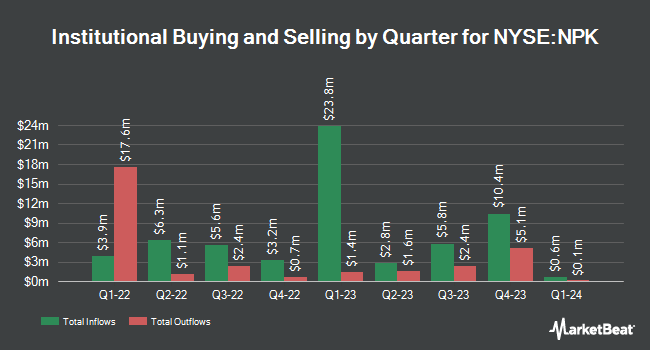Amanah Holdings Trust acquired a new position in shares of National Presto Industries, Inc. (NYSE:NPK - Free Report) in the 2nd quarter, according to the company in its most recent Form 13F filing with the Securities and Exchange Commission. The fund acquired 45,000 shares of the conglomerate's stock, valued at approximately $4,408,000. National Presto Industries comprises about 1.1% of Amanah Holdings Trust's investment portfolio, making the stock its 14th largest holding. Amanah Holdings Trust owned approximately 0.63% of National Presto Industries at the end of the most recent reporting period.
Several other large investors have also made changes to their positions in the business. Ellsworth Advisors LLC acquired a new position in shares of National Presto Industries during the 1st quarter worth about $616,000. Jones Financial Companies Lllp bought a new stake in shares of National Presto Industries in the 1st quarter worth approximately $1,627,000. MIRAE ASSET GLOBAL ETFS HOLDINGS Ltd. lifted its position in shares of National Presto Industries by 48.5% in the 1st quarter. MIRAE ASSET GLOBAL ETFS HOLDINGS Ltd. now owns 23,652 shares of the conglomerate's stock worth $2,079,000 after acquiring an additional 7,721 shares during the period. Cubist Systematic Strategies LLC bought a new stake in shares of National Presto Industries in the 1st quarter worth approximately $312,000. Finally, Royal Bank of Canada lifted its position in shares of National Presto Industries by 6.9% in the 1st quarter. Royal Bank of Canada now owns 6,400 shares of the conglomerate's stock worth $563,000 after acquiring an additional 414 shares during the period. Institutional investors and hedge funds own 58.57% of the company's stock.
National Presto Industries Stock Down 2.2%
Shares of NPK stock traded down $2.56 during mid-day trading on Friday, reaching $112.89. The stock had a trading volume of 34,023 shares, compared to its average volume of 59,268. The firm's 50 day simple moving average is $105.37 and its 200 day simple moving average is $94.87. National Presto Industries, Inc. has a one year low of $69.80 and a one year high of $117.46. The firm has a market cap of $807.13 million, a PE ratio of 19.40 and a beta of 0.51.
National Presto Industries (NYSE:NPK - Get Free Report) last announced its quarterly earnings data on Friday, August 8th. The conglomerate reported $0.72 EPS for the quarter. National Presto Industries had a return on equity of 11.42% and a net margin of 9.23%.The company had revenue of $120.45 million during the quarter.
National Presto Industries Profile
(
Free Report)
National Presto Industries, Inc provides housewares and small appliance, defense, and safety products in North America. The company's Housewares/Small Appliance segment designs, markets, and distributes housewares and small electrical appliances, including pressure cookers and canners; heat control line of skillets, griddles, woks, and multi-purpose cookers; slow cookers; deep fryers; air fryers; waffle makers; pizza ovens; slicer/shredders; electric heaters; hot air, oil, and microwave corn poppers; dehydrators; vacuum sealers; rice cookers; microwave bacon cookers; egg cookers; coffeemakers and coffeemaker accessories; electric knife sharpeners; and timers under the Presto Control Master brand.
Read More

Before you consider National Presto Industries, you'll want to hear this.
MarketBeat keeps track of Wall Street's top-rated and best performing research analysts and the stocks they recommend to their clients on a daily basis. MarketBeat has identified the five stocks that top analysts are quietly whispering to their clients to buy now before the broader market catches on... and National Presto Industries wasn't on the list.
While National Presto Industries currently has a Buy rating among analysts, top-rated analysts believe these five stocks are better buys.
View The Five Stocks Here
Discover the 10 Best High-Yield Dividend Stocks for 2025 and secure reliable income in uncertain markets. Download the report now to identify top dividend payers and avoid common yield traps.
Get This Free Report
Like this article? Share it with a colleague.
Link copied to clipboard.